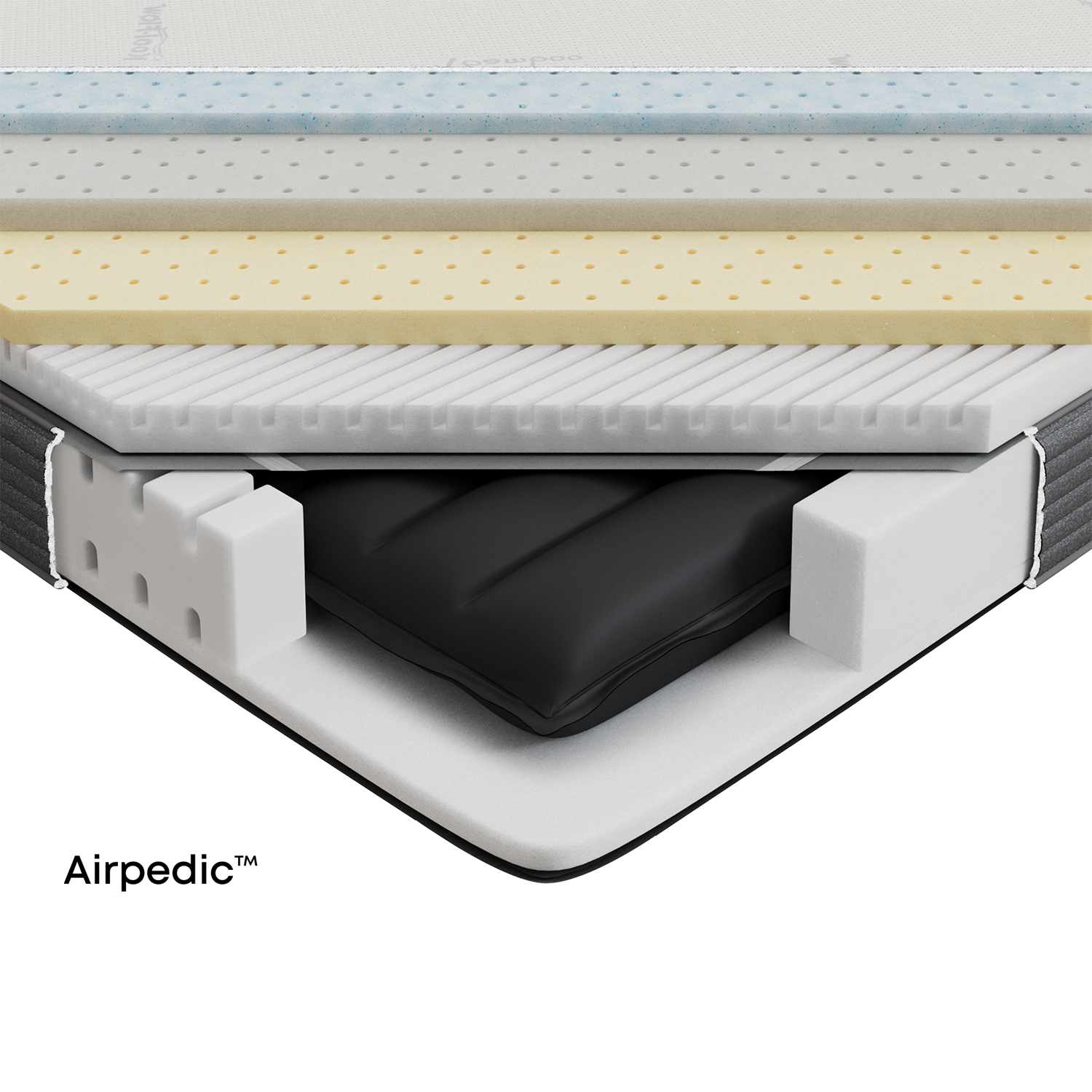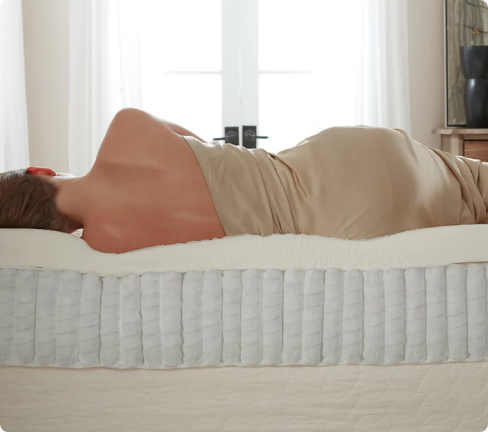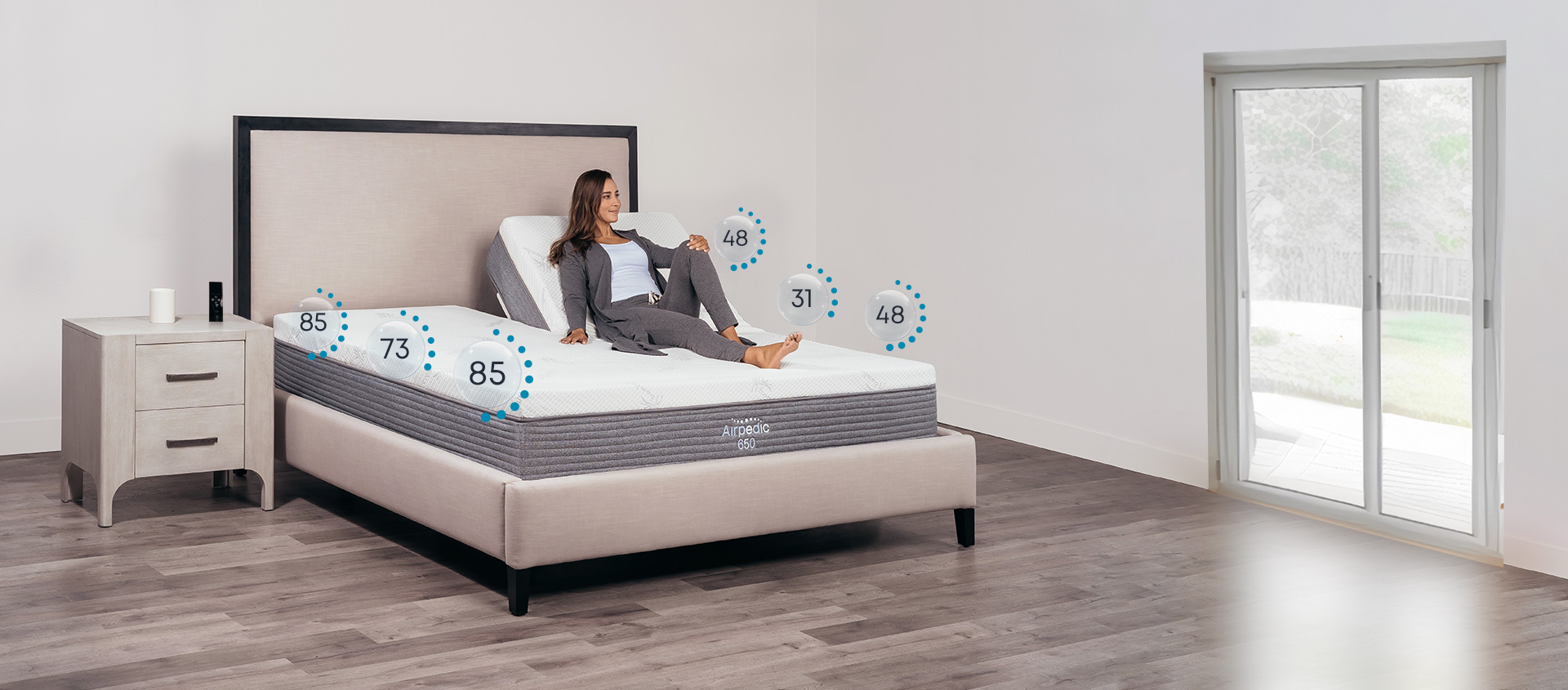
Gel Memory Foam vs. Memory Foam: Which Is the Best Mattress Material for You?
If you’re looking for a new mattress, you’ve probably heard of memory foam. After all, it has become a popular material choice for mattresses in recent years. It might even be on your short list of options, and rightfully so, with the many benefits it offers multiple types of sleepers. But what about gel memory foam? How does a gel memory foam mattress differ from a traditional memory foam mattress, and does it address any of the drawbacks?
At Airpedic®, with decades of expertise in adjustable orthopedic mattresses, bed bases, and sleep solutions, we specialize in a wide range of mattress materials, including regular memory foam and gel memory foam. Read on as we compare gel memory foam vs. memory foam, explaining the key differences between the two types of memory foam and the advantages and disadvantages you should consider when selecting the right mattress type for you.
What is Memory Foam?
Memory foam was developed by NASA in the 1960s to improve comfort and crash protection for pilots and passengers. The polyurethane material is a viscoelastic foam, meaning it combines viscosity (thick and sticky consistency) with elasticity (the ability to stretch and return to its original shape). Since its consumer debut in the 1980s, memory foam has revolutionized the mattress industry.
How Memory Foam Works
Memory foam adapts to heat due to its viscoelastic nature. When you lie on a memory foam mattress, your body heat softens the foam, allowing it to mold to your unique shape. This creates a personalized sleep surface that evenly distributes your weight and relieves pressure on key areas like your shoulders, hips, and back. Its elastic properties also allow the foam to return to its original shape once you get up, contributing to its longevity and durability.
Key Benefits of Memory Foam
Memory foam offers several advantages for sleepers, including:
Pressure Relief: Its contouring ability helps alleviate joint pain by reducing pressure on sensitive areas like shoulders and hips.
Motion Isolation: Memory foam minimizes motion transfer, making it ideal for couples. Movements on one side of the bed are less likely to disturb the other.
Spinal Alignment: By conforming to your body’s shape, memory foam helps maintain proper spinal alignment, reducing back pain and enhancing sleep quality.
What is Gel Memory Foam?
Gel memory foam is a more recent innovation designed to address one of the key drawbacks of traditional memory foam: heat retention. By infusing memory foam with cooling gel beads or particles, manufacturers have created a material that offers the same contouring benefits but with improved temperature regulation, making it the best cooling mattress option available on the market.
How Does Gel Memory Foam Work?
During the manufacturing process, gel beads or particles are added to the memory foam. These gel infusions act as cooling agents, drawing heat away from the body and preventing it from accumulating in the foam. The result is a gel mattress that provides the comfort and support of traditional memory foam while maintaining a cooler sleeping environment. Gel memory foam can also have a springier, softer feel, offering a range of firmness and plushness options.
Key Benefits of Gel Memory Foam
In addition to the benefits of traditional memory foam, gel memory foam offers:
Cooler Sleep: The cooling gel helps dissipate heat more effectively, making it ideal for those who tend to sleep hot.
Targeted Support: Gel memory foam maintains support in high-pressure areas like hips and shoulders while providing proper spinal alignment.
Versatility: Available in various firmness levels, gel memory foam offers pressure relief and comfort for a wide range of sleepers.
Memory Foam Beds and Temperature Regulation
When choosing between memory foam and gel memory foam, one of the key factors to consider is temperature control and how it affects your sleep environment.
Heat Retention in Memory Foam
Traditional memory foam has a dense structure that can trap heat. While this makes it ideal for colder climates or those who prefer a warmer sleeping environment, it may be less comfortable for people who tend to overheat at night. As your body sinks into the mattress, the foam’s heat retention can lead to a “hot sleeping” experience.
How Gel-Infused Foam Stays Cool

Gel memory foam addresses this issue by incorporating cooling agents, such as gel beads. These beads help draw heat away from the mattress surface and disperse it evenly, providing a cooler sleep experience. This makes a gel foam mattress particularly beneficial for hot sleepers or those living in warmer climates.
Which is Better for Temperature Control?
The choice depends on your personal sleep needs. If you live in a cooler climate or don’t overheat while sleeping, traditional memory foam mattresses may suffice. However, if you’re a hot sleeper or live in a warmer area, gel memory foam’s cooling properties can enhance comfort and improve sleep quality.
Memory Foam and Body Support

Both traditional and gel-infused memory foam mattresses provide excellent support, but there are some key differences in how they deliver comfort.
Support Offered by Standard Memory Foam
Memory foam’s claim to fame is its ability to evenly distribute body weight, reducing pressure points and promoting healthy spinal alignment. This is especially beneficial for side sleepers, as memory foam allows the hips and shoulders to sink just enough to maintain proper alignment without creating undue strain on the joints.
How A Gel-Infused Mattress Adds Support
Gel memory foam offers similar benefits in terms of support, but the addition of gel particles can provide more targeted support where heavier parts of the body tend to rest, like the lower back or hips. By dissipating heat in these areas, support can be better maintained rather than “giving” too much and losing resistance.
Comparing Comfort Levels
Of course, comfort is subjective, and different sleepers will have different preferences. Memory foam tends to have a softer, more “hug-like” feel, which makes it ideal for those who like to feel enveloped by their mattress. Gel memory foam, on the other hand, can offer a slightly firmer and springier “on-the-mattress” feel rather than “in-the-mattress.” This can benefit people who prefer to sleep on their backs or stomachs, providing a more balanced surface.
Memory Foam and Durability
Durability is a key consideration when investing in a mattress. It impacts how long the mattress will maintain its comfort and support, influencing the return on your investment.
Factors Affecting Memory Foam Durability
Foam density—how much material is packed into a given space—is crucial to determining longevity. Denser foams generally offer more resilience over time and tend to last longer than lower-density options. Overall, memory foam mattresses are known for their durability, with high-quality options typically lasting 8 to 10 years or even longer with proper use and care.
Impact of Gel on Durability
The addition of gel to memory foam can either enhance or reduce its lifespan, depending on the quality of the gel. Lower-quality gels may cause the foam to break down faster, leading to sagging or loss of support. In contrast, high-quality gel memory foam mattresses are engineered to resist these issues and offer a lifespan comparable to traditional memory foam.
Comparing Lifespan
Both memory foam and gel memory foam mattresses are built to last with proper care. A well-made memory foam mattress generally lasts 8 to 10 years, and gel memory foam mattresses offer a similar lifespan unless lower-quality materials are used. Choose a reputable manufacturer to ensure durability and review warranties and customer feedback before purchasing.
Memory Foam and Sleep Position
Your preferred sleep position and body type play a key role in choosing between memory foam and gel memory foam.
Memory Foam for Side Sleepers
Side sleepers benefit from memory foam’s contouring support, which allows the hips and shoulders to sink in while maintaining proper spinal alignment. Its pressure-relieving properties make memory foam an ideal choice for side sleepers.
Gel Memory Foam for Back and Stomach Sleepers
Gel memory foam is often better suited for back and stomach sleepers who need extra support in the lower back and hips. Its cooling properties make it an excellent option for hot sleepers or those in warmer climates.
Which is Best for You?
The right mattress depends on your sleep preferences. Memory foam is ideal if you’re a side sleeper or prefer a softer, more enveloping feel. However, if you sleep on your back or stomach, shift positions frequently, or sleep hot, gel memory foam may offer the perfect balance of support and cooling comfort.
Price Differences of Foam Mattresses
Price is often a key factor when choosing a mattress, especially when deciding between a regular memory foam and a gel memory foam bed. While both options offer great value, there are some price differences to consider.
Memory Foam Pricing
Memory foam mattresses are available at a range of prices, influenced by factors like foam density, brand reputation, and additional features. Higher-density foams are generally more expensive, but there are budget-friendly options that still provide solid support and comfort.
Gel Memory Foam Costs
Due to their cooling technology, gel memory foam mattresses tend to be priced higher than traditional memory foam mattresses. Depending on the brand, quality, and features, gel memory foam typically falls in the mid to high-end price range.
Finding Value for Money
When comparing prices, consider long-term value and sleep quality, not just upfront costs. While gel memory foam may have a higher initial price, its cooling and support benefits can enhance sleep quality, making it a worthwhile investment for many sleepers.
Choosing Between Memory Foam and Gel Memory Foam
In the comparison of gel memory foam vs. memory foam, there’s no one-size-fits-all answer. Both materials offer similar qualities but have unique benefits. While both types provide excellent spinal support and durability, traditional memory foam gives a warm, body-hugging feel, while gel foam offers a cooler, springier experience. The right choice depends on your specific needs, sleep style, and personal preferences. Whether you prioritize cooling, pressure relief, support, or cost, understanding these differences will help you make a more informed decision.
If you’re ready to learn more and make an investment in quality sleep and overall well-being, explore our selection of premium orthopedic adjustable air mattresses today. Looking for more personalized advice? Take our Mattress Match Up quiz or consult one of our sleep experts today. One of our premium cooling mattresses might just be your perfect sleep solution.
FAQS: Memory Foam and Gel Memory Foam Mattress
Which is better for back pain: memory foam or gel memory foam?
Both memory foam and gel memory foam can provide relief for back pain by contouring to your body and offering support where it’s needed most. However, if you tend to sleep hot, gel memory foam may be a better option since it helps regulate temperature while still providing excellent support. Gel memory foam is often recommended for those prioritizing a cooler sleep environment.
How long do memory foam and gel memory foam mattresses last?
On average, high-quality memory foam mattresses can last 8 to 10 years with proper care, while gel memory foam mattresses offer a similar lifespan. Be sure to check the density of the foam and the quality of the materials used, as these factors impact durability. Regular mattress maintenance, such as using a mattress protector and rotating the mattress, can help extend its life.
Is there a price difference between memory foam and gel memory foam?
Due to the added cooling technology, gel memory foam mattresses tend to be priced higher than traditional memory foam mattresses. However, the price difference varies based on the brand, foam density, and additional features. Many consumers find that the cooling benefits of gel memory foam are worth the extra cost, especially if they sleep hot.
Can I use memory foam or gel memory foam mattresses with adjustable bed bases?
Yes, both memory foam and gel memory foam mattresses are compatible with adjustable bed bases. Their flexibility and contouring abilities make them ideal for adjustable beds, allowing the mattress to move smoothly with the base while still providing support and comfort.
How do I know which mattress firmness is right for me?
Choosing the right firmness depends on your sleep position and personal preference. Side sleepers generally prefer a softer feel to relieve pressure on their hips and shoulders, while back and stomach sleepers may need a firmer mattress to maintain proper spinal alignment. Many gel memory foam mattresses offer various firmness levels, making them versatile for different sleeping styles.
Are memory foam and gel memory foam mattresses good for couples?
Yes, both types are excellent for couples due to their motion isolation properties. If one person moves or gets out of bed at night, the other person is less likely to feel it. Gel memory foam can be particularly beneficial for couples who sleep at different temperatures, as it helps regulate heat.
Will memory foam or gel memory foam lose its shape over time?
Over time, lower-quality memory foam mattresses may lose their shape or develop indentations. However, high-density, high-quality memory foam, and gel memory foam mattresses are designed to retain their shape and provide consistent support for many years. Regular rotation and care can help maintain the mattress’s form.
Experience a new degree of personalized sleep.

Find the Airpedic® that’s just right for your sleep needs.

Buy with monthly payments.
Get an Airpedic Mattress starting as low as $84/mo
or interest-free.
Read More About Healthy Sleep

For those with scoliosis, finding the best mattress isn’t just about comfort; it’s about minimizing and alleviating pain—if not avoiding it altogether—to achieve higher-quality sleep and overall wellness. This guide delves into what scoliosis is, how it impacts sleep and the essential features those with scoliosis should look for in…

Are you curious about split king beds but unsure if they’re the right choice for you? As a leader in customizable sleep solutions, including adjustable air mattresses, bases, and split king beds, Airpedic® understands the challenges of finding the perfect mattress, especially for couples with different sleep preferences. The split…
View More
Call one of our sleep experts to place an order.
Business Hours
- Monday - Friday 8:00am - 6:00pm PST
- Saturday - Sunday 10:00am - 6:00pm PST


